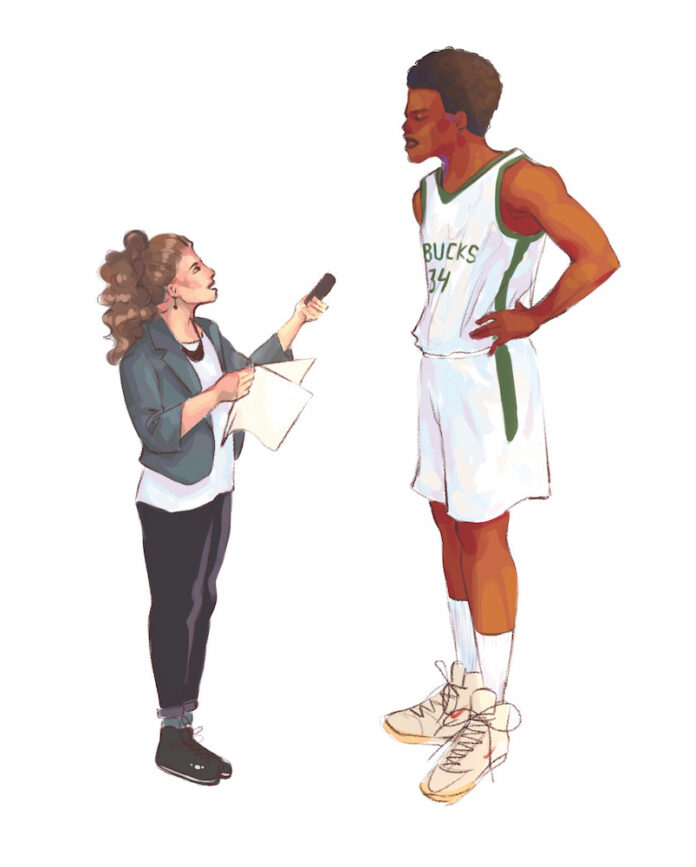In 2018, Occidental alumna Mirin Fader ’13 boarded a flight for Lithuania. She was bound for Prienai, a town of fewer than 10,000 residents whose population had, at least temporarily, been increased by one. Then a freelancer for Bleacher Report, Fader had been hired to write a feature on then-16-year-old LaMelo Ball — a supposed basketball prodigy and next in line as heir to the Ball family basketball media empire. Ball’s father had pulled him out of high school to play for Prienai’s professional basketball team. As she buckled her seatbelt and stowed her tray table, Fader didn’t know what the story would be yet. She didn’t even have access to Ball. But in the end, Fader said, her story on the 16-year-old took her places she had never imagined.
“It changed my life, changed my whole career,” Fader said. “Everything changed after that moment.”
Three years later, Fader is a bestselling author on the New York Times, LA Times, Wall Street Journal, USA Today and Publishers Weekly lists for her new book, “Giannis: The Improbable Rise of an NBA MVP,” which debuted Aug. 10. The book highlights Giannis Antetokounmpo, the Greek NBA superstar who led the Milwaukee Bucks to their first NBA Championship since the days of Kareem Abdul-Jabbar in 1971. It tracks the two-time NBA MVP and his family’s life as Nigerian immigrants in Athens, Greece, struggling against financial hardship and racism, to his eventual superstardom in the U.S. Fader is also a long-form sports feature writer for The Ringer, covering some of the biggest names in sports.
Before Giannis Antetokounmpo and the bestseller lists, Fader attended Lewis & Clark College in Portland, Oregon, and had hoop dreams of her own. Then a 5’2” freshman point guard for the Pioneers, Fader struggled to get playing time, even in blowout losses. As her love for basketball turned bittersweet, Fader turned to storytelling as a release.
“I ended up realizing it wasn’t about the sports anymore,” Fader said. “I got into this [writing] because I was really depressed about basketball, and I needed to stay in it. But then I realized I love writing more than I ever loved basketball.“
While Fader mulled her future, she lost herself in fiction, a skill Fader said helped her writing in the long run.
“Lewis & Clark had a state-of-the-art library; it was so wonderful. It was open at all hours of the day, so I would come out of practice at like 9 p.m. and just be reading all night there,” Fader said.
Fader transferred to Occidental for her sophomore year in 2010 and began writing in earnest. After Fader transferred to Occidental, she spent a few weeks writing for The Occidental — then known as the Oxy Weekly — before beginning to work as men’s basketball beat writer for then Sports Information Director Michael Wells, who now is an associate head coach for the men’s basketball team at Occidental.
“In my 10 years working in sports information at Occidental, she’s far and away the best writer I’ve ever had and it’s not close,” Wells said. “She would write these incredible feature articles. If she covered a game, she made it come to life.”
In 2013 Fader wrote one of her first feature stories on then-starting point guard Sam Stapleton ’13 titled “Sam Stapleton: From Senior Captain to Future Coach.” Fader said that story was a turning point in her writing career.
“When I did that profile, I was like, ‘Why am I the beat writer? I want to do features,’” Fader said.
According to Stapleton, now an assistant men’s basketball coach at California State University Dominguez Hills, that story still holds meaning for him — no matter how long ago it may have been written.
“My parents still have that framed up in their house,” Stapleton said. “It’s kind of funny, the importance and the meaning behind it, and multiple layers — I still refer back to that every now and then to kind of remind myself of my passion and my drive, and for her, that’s probably in her mind as when her writing was at [its] beginning.”
According to Fader, English professor Jean Wyatt also played a pivotal role in showing her the power of language once she arrived at Occidental.
“She was telling us about Virginia Woolf’s suicide during class once, and she just started crying,” Fader said. “I was so moved by this moment, because I was like, ‘Oh, my God, literature can do that? Writing can move somebody like that?’ That was a memory that just stuck with me.”
One of Fader’s first friends at Occidental was Erica Jackman ’13, who shared a class with Fader their sophomore year. The two had a habit of showing up to class 15 minutes early, Fader said, and became fast friends.
According to Jackman, Fader’s ability to capture the essence of a person makes her stories fascinating to anyone.
“Her writing is really special in that, you know, you don’t have to be a sports lover to really enjoy what she’s writing,” Jackman said. “She has a really special way of getting to the heart of whoever she’s writing about.”
When Fader graduated Occidental in 2013, she went to work for the Orange County Register, covering all kinds of sports, not specifically basketball.
“As I was learning more about other sports, I was falling in love with storytelling, not necessarily the sport, and I was doing meaningful stories on other sports that didn’t require the same basketball knowledge,” Fader said. “I had such a determination, the hunger to tell those stories, even though it wasn’t basketball.”
That drive was evident from the start, according to Wells, and while Wells said he could never have predicted how much Fader has achieved, he knew she was destined for great things.
“It doesn’t surprise me anytime she succeeds at anything, because she is so talented. It really is pretty neat,” Wells said. “It’s seemed like the more she wrote for people, the more people liked her writing, and the more she just kind of ascended. I’m not surprised at all where she is now.”
According to Fader, she feels drawn to tell athletes’ stories in particular because of the public nature of both their triumphs and their failures.
“They have to face failure on a daily basis publicly, while so many of us get to fail privately — and they have to do it on full display all the time. I’m fascinated by how they do that,” Fader said. “Why is somebody the way that they are? Where did they come from? What’s their backstory? How did they become this? That’s what I like.”
Regardless of Fader’s later success, Stapleton said he was grateful for Fader’s commitment to telling the Occidental team’s stories.
“At a Division III school, the only people that care about your games are your family and your friends there,” Stapleton said. “That’s like the equivalent of 20,000 people rooting for you when you play for Alabama football — one person like her, giving a dang about the work you put in and making you feel important.”
After the Register, Fader moved on to Bleacher Report. According to Fader, her feature on LaMelo Ball may have propelled her feature-writing career to new heights, but it came at its own cost.
“It was so hard, but as with most hard things, you don’t appreciate how important they are until you get through it,” Fader said. “Everything changed after that moment, it was a real turning point. But I was absolutely miserable. I got really sick; I was barely eating. I lost like 10 pounds. It was just the worst, but it was amazing.”
Stories are supposed to be complicated, Fader said, because if they aren’t, the writer does the story and subject a disservice.
“Yeah, I am drawn to stories that are tough,” Fader said. “But life is really tough. I don’t want to be a writer that just writes about happy things. I don’t want to be a writer that ties a bow.”
While Fader has interviewed some of the sporting world’s preeminent stars, from Davante Adams to Brandon Ingram, Fader said her talent for connecting with athletes comes in part from an ability to separate the fame from the star, the aura from the person.
“When I look at Giannis, I don’t see this famous basketball player. I know that about him, but I just see a guy,” Fader said. “I see Pat Beverley, and I’m like, ‘Oh, I recognize guys that played like him playing pickup.’ I think the more mothers you meet, the more you realize that you’re just somebody’s son, and it shrinks the narrative to the point where you kind of forget it exists.”
A key characteristic of a Mirin Fader feature is an in-depth interview with the subject’s mother, a practice which Fader said she has made a habit of over the years.
“There’s nobody that knows their sons through and through like the moms,” Fader said. “Because as soon as they walk in her home, they’re just their son.”
According to Fader, this had a very real impact on her ability to write her book on Giannis in the first place. Veronica Antetokounmpo, Giannis’ mother, was instrumental in getting Fader access to Giannis, Fader said.
“I only got to Giannis because Veronica was like, ‘Talk to her,’” Fader said. “It literally wouldn’t have happened if she had not gone up to him and said, ‘Talk to her.’”

In writing her book, Fader collaborated with Mary Christianakis, a bilingual Critical Theory & Social Justice (CTSJ) professor at Occidental. Christianakis helped translate Greek documents and articles to English.
According to Christianakis, she was happy to help, despite never having Fader as a student.
“Oxy is a pretty tight community, and when you’re a part of the Oxy community, you’re kind of part of it forever,” Christianakis said.
Christianakis said Fader’s background as an athlete was apparent, not only in her focus on sports, but her approach to writing her book.
“I’m actually in awe of Mirin. I think that she’s a very determined, hardworking and smart person,” Christianakis said. “You see that a lot from athletes. Being on a team forces you to prioritize your time, it asks of you to commit to something, so you could see her multiple forms of training coming into play.”
According to Christianakis, Greek pride in Giannis is tremendous.
“When the Greek diaspora read about those things and hear about them on Greek TV, it’s always one of those moments where the country is proud of their collective accomplishment,” Christianakis said. “But clearly, it’s his talent.”
For Fader, some of the empathy she has as a reporter is built on a foundation of feeling cast aside in sport herself, especially given her height and gender.
“I think that empathy is probably the strongest trait you can ever have as a reporter. You have to have that to do these types of stories, meaning you have to be a good listener. You have to be able to hear people out and try to understand where they’re coming from and not judge them, but just listen to them,” Fader said. “I am an empathetic, compassionate person because I have been on the outside looking in, in a lot of moments, whether it’s, ‘You’re too short,’ or ‘You’re a woman,’ there’s all these things where I wasn’t quite right.”
Much of Fader’s work highlights the beauty in some of sports’ most tragic figures, such as Tyler Skaggs, an Angels pitcher who passed away of an overdose in 2019, and Gianna Bryant, daughter of Lakers legend Kobe Bryant, who passed away in a helicopter crash with her father in 2020.
According to Fader, she learned to lean into her emotion when writing, rather than shy away from it.
“Feature writing is this weird, inhumane intimacy,” Fader said. “It’s only natural that you feel things when you do this work. I feel like there’s that tendency to say, ‘Turn it off,’ but if I want you to feel something, how can I not feel something?”
Fader’s genuine interest in her subjects sets her writing apart from other writers, according to Jackman.
“She really cares about people,” Jackman said. “And from her own experience with basketball, she really knows which questions to ask to get to people’s motivations, where they’re coming from, their history, their background, their struggle. I think that’s what really makes her work stand out.”
Fader said Davante Adams still jokes with her that she forgot to ask him about Aaron Rodgers, Adams’ star quarterback, when she interviewed him. According to Fader, her relentless pursuit of her subjects’ core identity is what allows sources to feel comfortable sharing what makes them tick.
“I do want to know about you,” Fader said. “I want to know about your mom, I want to know about your upbringing, I want to know about your fears. I want to know about the thing that keeps you up at night. And I think when you ask that type of question, they can see that it is genuine, and I think they open up about it because of that.”
![]()




































